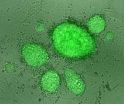(Press-News.org) MADISON, Wis. – The link between a protein typically associated with Alzheimer's disease and its impact on memory and cognition may not be as clear as once thought, according to a new study from the University of Wisconsin-Madison's Waisman Center. The findings are revealing more information about the earliest stages of the neurodegenerative disease.
The researchers — including lead study author Sigan Hartley, UW-Madison assistant professor of human development and family studies, and Brad Christian, UW-Madison associate professor of medical physics and psychiatry and director of PET Physics in the Waisman Laboratory for Brain Imaging and Behavior — looked at the role of the brain protein amyloid-β in adults living with Down syndrome, a genetic condition that leaves people more susceptible to developing Alzheimer's. They published their findings in the September issue of the journal Brain.
"Our hope is to better understand the role of this protein in memory and cognitive function," says Hartley. "With this information we hope to better understand the earliest stages in the development of this disease and gain information to guide prevention and treatment efforts."
However, the findings of their study not only may help scientists better understand the condition as it impacts those living with Down syndrome, but they are also relevant to adults without the genetic syndrome.
"There are many unanswered questions about at what point amyloid-β, together with other brain changes, begins to take a toll on memory and cognition and why certain individuals may be more resistant than others," says Hartley.
The UW-Madison scientists, along with collaborators at the University of Pittsburgh, studied 63 healthy adults with Down syndrome, aged 30 to 53, who did not exhibit clinical signs of Alzheimer's or other forms of dementia. They found that many adults with Down syndrome had high levels of amyloid-β protein but did not suffer the expected negative consequences of the elevated protein.
Alzheimer's disease is the sixth leading cause of death in the U.S. People with Down syndrome are born with an extra copy of the 21st chromosome, where the gene that codes for the amyloid-β protein resides.
For the study, which was conducted over the course of two days, researchers used magnetic resonance imaging (MRI) and positron emission tomography (PET) scans to capture images of the participants' brains. Twenty-two of the 63 participants had elevated levels of amyloid-β but showed no evidence of diminished memory or cognitive function when compared to those without elevated levels of the protein. The researchers controlled for differences in age and intellectual level.
Similarly, when assessed as a continuous measure, amyloid-β levels were not tied to differences in memory or cognitive ability, such as changes in visual and verbal memory, attention and language.
INFORMATION:
Hartley and Christian also partnered with Marsha Mailick, interim vice chancellor for research and graduate education and Vaughan Bascom and Elizabeth M. Boggs Professor, and UW Alzheimer's Disease Research Center (ADRC) investigators on the study. With funding from the National Institute of Aging, the researchers plan to follow these 63 adults for the next several years, to continue to track the accumulation of amyloid-β and its effects over time.
Marlena Holden
4 608-262-6503
mgholden@waisman.wisc.edu
Down syndrome helps researchers understand Alzheimer's disease
2014-09-18
ELSE PRESS RELEASES FROM THIS DATE:
Research yields a game changer for improving understanding of Ebola and great apes
2014-09-18
A group of international scientists have developed a new method to study Ebola virus in wildlife. Video link here.
The Wildlife Conservation Society (WCS)-led research, published today in the journal PLOS Neglected Tropical Diseases, describes the use of fecal samples from wild great apes to identify populations likely to have been exposed to the virus. This represents a new tool for performing large, population-scale field assessments that can potentially change the way Ebola virus is studied and improve our understanding of the virus' distribution in space and time—a ...
Single dose of antidepressant changes the brain
2014-09-18
A single dose of antidepressant is enough to produce dramatic changes in the functional architecture of the human brain. Brain scans taken of people before and after an acute dose of a commonly prescribed SSRI (serotonin reuptake inhibitor) reveal changes in connectivity within three hours, say researchers who report their observations in the Cell Press journal Current Biology on September 18.
"We were not expecting the SSRI to have such a prominent effect on such a short timescale or for the resulting signal to encompass the entire brain," says Julia Sacher of the Max ...
Gambling with confidence: Are you sure about that?
2014-09-18
Cold Spring Harbor, NY – Life is a series of decisions, ranging from the mundane to the monumental. And each decision is a gamble, carrying with it the chance to second-guess. Did I make the right turn at that light? Did I choose the right college? Was this the right job for me?
Our desire to persist along a chosen path is almost entirely determined by our confidence in the decision: when you are confident that your choice is correct, you are willing to stick it out for a lot longer.
Confidence determines much of our path through life, but what is it? Most people ...
Stem cells use 'first aid kits' to repair damage
2014-09-18
Stem cells hold great promise as a means of repairing cells in conditions such as multiple sclerosis, stroke or injuries of the spinal cord because they have the ability to develop into almost any cell type. Now, new research shows that stem cell therapy can also work through a mechanism other than cell replacement.
In a study published today in Molecular Cell, a team of researchers led by the University of Cambridge has shown that stem cells "communicate" with cells by transferring molecules via fluid filled bags called vesicles, helping other cells to modify the damaging ...
NYU Langone scientists report reliable and highly efficient method for making stem cells
2014-09-18
NEW YORK, September 18, 2014 – Scientists at NYU Langone Medical Center have found a way to boost dramatically the efficiency of the process for turning adult cells into so-called pluripotent stem cells by combining three well-known compounds, including vitamin C. Using the new technique in mice, the researchers increased the number of stem cells obtained from adult skin cells by more than 20-fold compared with the standard method. They say their technique is efficient and reliable, and thus should generally accelerate research aimed at using stem cells to generate virtually ...
The war on leukemia: How the battle for cell production could be decisive
2014-09-18
A key step in understanding the nature of the fight for superiority between mutated genes and normal genes could lead to new therapies to combat leukaemia, say researchers from the University of Birmingham and Newcastle University.
The study, published in Cell Reports, investigated Acute Myeloid Leukaemia to understand why leukemic cells are not able to develop normally into mature blood cells.
Stem cells in the bone marrow generate billions of different blood cells each day. The process resembles a production line with genes acting as regulators to control each step ...
NASA sees Hurricane Edouard enter cooler waters
2014-09-18
VIDEO:
On Sept. 17 at 03:39 UTC, the TRMM satellite saw a newer outer eyewall forming around Edouard's original eyewall creating a double eye-wall structure. Red indicates heavy rainfall....
Click here for more information.
NASA's Tropical Rainfall Measuring Mission or TRMM satellite and Aqua satellite gathered data on Hurricane Edouard's rainfall, clouds and waning power is it continued moving northward in the Atlantic into cooler waters. On Sept. 18, NASA's Global Hawk #872 ...
Scientists find how mysterious 'circular RNA' is formed, claim muscular dystrophy link
2014-09-18
Our genetic information is stored in DNA, tiny strands of nucleic acid that contain instructions for the functioning of our bodies. To express this genetic data, our DNA is copied into RNA molecules, which then translate the instructions into proteins that perform tasks in our cells.
Several years ago, scientists discovered a new type of RNA molecule. Unlike all other known RNAs, this molecule is circular, and was labeled circular RNA. Although circRNA molecules are abundant, little has been known about how they are produced. Moreover, little has been known about the ...
Flu vaccine for expectant moms a top priority
2014-09-18
WHITE PLAINS, NY, SEPT. 18, 2014 -- Only about half of all pregnant women in the U.S. get a flu shot each season, leaving thousands of moms-to-be and their babies at increased risk of serious illness.
"Getting a flu shot should be a routine part of prenatal care," said Edward McCabe, MD, March of Dimes chief medical officer. "Health care providers should offer their pregnant patients a flu shot each year and if they don't, then women should ask for it."
A report by the U.S. Centers for Disease Control and prevention presented today by the National Foundation for ...
New high-resolution satellite image analysis: 5 of 6 Syrian World Heritage sites 'exhibit significant damage'
2014-09-18
SEPTEMBER 18 —In war-torn Syria, five of six World Heritage sites now "exhibit significant damage" and some structures have been "reduced to rubble," according to new high-resolution satellite image analysis by the nonprofit, nonpartisan American Association for the Advancement of Science (AAAS).
The AAAS analysis, offering the first comprehensive look at the extent of damage to Syria's priceless cultural heritage sites, was completed in partnership with the University of Pennsylvania Museum of Archaeology and Anthropology's Penn Cultural Heritage Center (PennCHC) and ...



